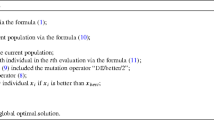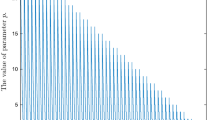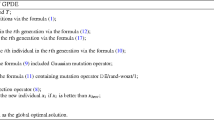Abstract
Differential evolution (DE) has become a very popular and effective global optimization algorithm in the area of evolutionary computation. In spite of many advantages such as conceptual simplicity, high efficiency and ease of use, DE has two main components, i.e., mutation scheme and parameter control, which significantly influence its performance. In this paper we intend to improve the performance of DE by using carefully considered strategies for both of the two components. We first design an adaptive mutation scheme, which adaptively makes use of the bias of superior individuals when generating new solutions. Although introducing such a bias is not a new idea, existing methods often use heuristic rules to control the bias. They can hardly maintain the appropriate balance between exploration and exploitation during the search process, because the preferred bias is often problem and evolution-stage dependent. Instead of using any fixed rule, a novel strategy is adopted in the new adaptive mutation scheme to adjust the bias dynamically based on the identified local fitness landscape captured by the current population. As for the other component, i.e., parameter control, we propose a mechanism by using the Lévy probability distribution to adaptively control the scale factor F of DE. For every mutation in each generation, an F i is produced from one of four different Lévy distributions according to their historical performance. With the adaptive mutation scheme and parameter control using Lévy distribution as the main components, we present a new DE variant called Lévy DE (LDE). Experimental studies were carried out on a broad range of benchmark functions in global numerical optimization. The results show that LDE is very competitive, and both of the two main components have contributed to its overall performance. The scalability of LDE is also discussed by conducting experiments on some selected benchmark functions with dimensions from 30 to 200.
Similar content being viewed by others
Explore related subjects
Discover the latest articles, news and stories from top researchers in related subjects.References
Storn R, Price K. Differential evolution — A simple and efficient heuristic for global optimization over continuous spaces. Journal of Global Optimization, 1997, 11(4): 341–359.
Price K, Storn R, Lampinen J. Differential Evolution: A Practical Approach to Global Optimization. Springer-Verlag, 2005.
Chakraborty (ed.) U K. Advances in Differential Evolution. Springer-Verlag, 2008.
Das S, Suganthan P N. Differential evolution: A survey of the state-of-the-art. IEEE Trans. Evolutionary Computation, 2011, 15(1): 4–31.
Das S, Abraham A, Chakraborty U K, Konar A. Differential evolution using a neighborhood-based mutation operator. IEEE Trans. Evolutionary Computation, 2009, 13(3): 526–553.
Zhang J, Sanderson A C. JADE: Adaptive differential evolution with optional external archive. IEEE Trans. Evolutionary Computation, 2009, 13(5): 945–958.
Qin A K, Huang V L, Suganthan P N. Differential evolution algorithm with strategy adaptation for global numerical optimization. IEEE Trans. Evolutionary Computation, 2009, 13(2): 398–417.
Yang Z, Tang K, Yao X. Self-adaptive differential evolution with neighborhood search. In Proc. the 2008 IEEE Congress on Evolutionary Computation, June 2008, pp.1110–1116.
Gämperle R, Müller S D, Koumoutsakos P. A Parameter study for differential evolution. In Proc. WSEAS International Conference on Advances in Intelligent Systems, Fuzzy Systems, Evolutionary Computation, 2002, pp.293–298.
Wang Y, C Z, Zhang Q. Differential evolution with composite trial vector generation strategies and control parameters. IEEE Trans. Evolutionary Computation, 2011, 15(1): 55–66.
Brest J, Greiner S, Boskovic B, Mernik M,·Žumer V. Self-adapting control parameters in differential evolution: A comparative study on numerical benchmark problems. IEEE Trans. Evolutionary Computation, 2006, 10(6): 646–657.
Das S, Konar A, Chakraborty U K. Two improved differential evolution schemes for faster global search. In Proc. the 2005 Conf. Genetic and Evolutionary Computation, June 2005, pp.991–998.
Abbass H A. The self-adaptive Pareto differential evolution algorithm. In Proc. the 2002 IEEE Congress on Evolutionary Computation, May 2002, pp.831–836.
Salman A, Engelbrecht A, Omran M (2007) Empirical analysis of self-adaptive differential evolution. European Journal of Operational Research 183(2):785–804
Yang Z, He J, Yao X. Making a difference to differential evolution. In Advances in Metaheuristics for Hard Optimization, Michalewicz, Z, Siarry P (eds.), Springer, 2008, pp.397–414.
Bäck T, Schwefel HP (1993) An overview of evolutionary algorithms for parameter optimization. Evolutionary Computation 1(1):1–23
Yao X, Liu Y, Lin G (1999) Evolutionary programming made faster. IEEE Trans Evolutionary Computation 3(2):82–102
Lee CY, Yao X (2004) Evolutionary programming using mutations based on the Lévy probability distribution. IEEE Trans Evolutionary Computation 8(1):1–13
Storn R (1999) System design by constraint adaptation and differential evolution. IEEE Trans Evolutionary Computation 3(1):22–34
Yang Z, Tang K, Yao X (2011) Scalability of generalized adaptive differential evolution for large-scale continuous optimization. Soft Computing 15(11):2141–2155
Wang Y, Cai Z, Zhang Q (2012) Enhancing the search ability of differential evolution through orthogonal crossover. Information Sciences 185(1):153–177
Lévy P. Théorie de l’addition des variables aléatoires. Gauthier-Villars Paris, 1937.
Gnedenko B, Kolmogorov A. Limit Distribution for Sums of Independent Random Variables. Cambridge, MA, USA: Addition-Wesley, 1954.
Qin A K, Suganthan P N. Self-adaptive differential evolution algorithm for numerical optimization. In Proc. the 2005 IEEE Congress on Evolutionary Computation, Vol.2, September 2005, pp.1785–1791.
Peng F, Tang K, Chen G, Yao X (2010) Population-based algorithm portfolios for numerical optimization. IEEE Trans Evolutionary Computation 14(5):782–800
Shen L, He J. A mixed strategy for evolutionary programming based on local fitness landscape. In Proc. the 2010 IEEE Congress on Evolutionary Computation, July 2010, pp.1–8.
Yao X, Lin G, Liu Y. An analysis of evolutionary algorithms based on neighbourhood and step sizes. In Proc. the 6th International Conference on Evolutionary Programming VI, April 1997, pp.297–307.
Schwefel H P. Evolution and Optimum Seeking. John Wiley & Sons, 1995.
Suganthan P N, Hansen N, Liang J J, Deb K, Chen Y P, Auger A, Tiwari S. Problem definitions and evaluation criteria for the CEC 2005 special session on real-parameter optimization. Technical Report, Nanyang Technological University, Singapore, 2005.
Yang Z, Tang K, Yao X (2008) Large scale evolutionary optimization using cooperative coevolution. Information Sciences 178(15):2985–2999
Hansen N, Auger A, Finck S, Ros R. Real-parameter black-box optimization benchmarking 2010: Experimental setup. Institut National de Recherche en Informatique et en Automatique (INRIA), 2010.
Hansen N. Compilation of results on the 2005 CEC bench-mark function set. Technical Report, Computational Laboratory, Institute of Computational Science, ETH Zurich, 2005.
Liu Y, Yao X, Zhao Q, Higuchi T. Scaling up fast evolutionary programming with cooperative coevolution. In Proc. the 2001 IEEE Congress on Evolutionary Computation, May 2001, pp.1101–1108.
van den Bergh F, Engelbrecht AP (2004) A cooperative approach to particle swarm optimization. IEEE Trans Evolutionary Computation 8(3):225–239
Li X, Yao X (2012) Cooperatively coevolving particle swarms for large scale optimization. IEEE Trans Evolutionary Computation 16(2):210–224
Author information
Authors and Affiliations
Corresponding author
Additional information
This work was partially supported by the National Natural Science Foundation of China under Grant Nos. 71071106 and 70801062.
Electronic Supplementary Material
Below is the link to the electronic supplementary material.
Rights and permissions
About this article
Cite this article
He, RJ., Yang, ZY. Differential Evolution with Adaptive Mutation and Parameter Control Using Lévy Probability Distribution. J. Comput. Sci. Technol. 27, 1035–1055 (2012). https://doi.org/10.1007/s11390-012-1283-3
Received:
Revised:
Published:
Issue Date:
DOI: https://doi.org/10.1007/s11390-012-1283-3




